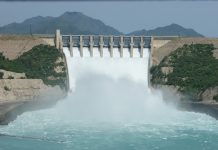Two liberal-leaning economists with prior government experience to manage the finance ministry. One big-shot industrialist that can wrangle his fellow titans of business when needed and go out to bat for them when needed. And one pliant, sober, and affable politicians that can sit in a chair, take directions, and be their boss.
Stir well until mixed.
This is the perfect recipe for a technocratic dream-team to manage the economy. And that is exactly what we have gotten in the shape of Pakistan’s incumbent caretaker government. You have in the driving seat Prime Minister Anwar ul Haq Kakar. By all reports and estimations he is a good-natured and sensible man. He is also a founding member of the Balochistan Awami Party, has a good working relationship with politicians across parties, and is cosy with the establishment.
Handling the finance ministry is the duo of Dr Shamshad Akhtar and Dr Waqar Masood. In her second stint as caretaker finance minister, having also held the ministry in the last caretaker setup in 2018, Dr Akhtar is well-respected and possesses a steady head on her shoulders — a quality the finance ministry has been missing in recent times. She has also served as governor of the State Bank before this. By her side is Dr Waqar Masood, a former finance secretary who also served former prime minister Imran Khan in an advisory capacity and is neutral enough to have also been considered by Ishaq Dar for a position as minister of state. Together the two have the necessary capabilities to maintain the status quo and see Pakistan through the current IMF programme.
And then finally there is Gohar Ejaz, who has taken over the commerce ministry. One of the most powerful industrialists in Pakistan, he is the patron of the All Pakistan Textile Mills Association (APTMA) and also has vast interests in real estate. His word carries weight in the business community, and he also has the stable temperament that is required for the job.
There is nothing particularly unique about this combination of people. You could replace Shamshad Akhtar with Abdul Hafeez Sheikh or Dr Ishrat Hussain and Dr Waqar Masood with another former bureaucrat and Gohar Ejaz with a different industrialist and pretty much guarantee that nothing would change except the faces.
Normally this is exactly what you want from your caretaker government. The concept of having a consensus-based government for a few months is archaic in itself. Developed democracies should have seamless transfers of powers with independent elections that cannot be manipulated. But when you have constitutionally stipulated caretaker governments, you want them to be as run-of-the-mill as humanly possible.
In normal circumstances a caretaker government comes in for a two-month stint and the entirety of the state machinery is so focused on conducting elections that the rest of the government runs almost on auto-pilot. In fact, other than the prime minister and interior minister’s posts, caretaker cabinet positions are mostly just a notch on people’s CVs. But the circumstances are far from normal.
By all indications the caretakers are here to stay. If the fawning praises by establishment-friendly journalists and espousing the qualities of ‘technocrats’ in cabinet were not enough of a sign, the Election Commission of Pakistan’s decision to conduct fresh delimitation of constituencies has made it all but a certainty that general elections will not be held within the constitutionally stipulated 90 days.
This puts Prime Minister Anwar ul Haq Kakar and his recently inducted cabinet in a peculiar position. Caretaker governments constitutionally have the solemn duty of ensuring free, fair, and timely elections. But at the same time they have the responsibility of running the day-to-day affairs of government that are necessary to keep the country afloat.
And while elections should be the only thing that any caretaker should very well be remembered for, all eyes will be on how he manages the economy.
The caretaker setup has come in at a time when Pakistan’s economy is facing a crisis that could be the worst in the country’s history. On the one hand prices of essential commodities are continuing to rise and inflation is spiralling out of control. The dollar has breached the psychological and historic barrier of Rs 300 which is worrying market sentiments. The rupee is expected to continue taking more beatings. On top of this utility prices are increasing and there is vast unhappiness over electricity prices. Reports of protests against high bills and people beating up linemen sent to cut connections are a cause for concern for the caretakers and their handlers.
The issue of high electricity prices, of course, is directly related to the agreement with the IMF. It must be remembered that on the 30th of June last year Pakistan failed to complete the last IMF programme it had entered and it seemed the country had no choice but to default on its external debts. However, prime minister Shehbaz Sharif managed to achieve a stop-gap accord with the fund. The current deal Pakistan is surviving under is a $3 billion stand-by agreement that will last for a period of nine months and is higher than expected for Pakistan. Only the first tranche of this facility has been extended to Pakistan as of now.
This stand-by-agreement ensured that whatever caretaker setup came in would not have to go beyond its constitutional limits and negotiate a programme with the fund. However, it also means that Mr Kakar must now ensure that the IMF’s conditions are met. As prices of petrol have been raised and are expected to be raised again. The gap between the interbank and open market rate of the dollar is quickly closing as per the IMF’s requirements. However, the entire burden of this is falling on Pakistan’s middle and lower classes. Instead of placing the responsibility for the circular debt problem on the people of Pakistan, a better solution must be hammered out.
Already the inflation problem raging through the country is continuing to hurt the weakest segments of society. People’s purchasing power is going down and with baseline inflation incredibly high the State Bank’s recent claims that inflation will slow down seem suspect. In fact, the SBP in its latest monetary policy maintained the interest rate at 22%. But with the SBP currently little more than an extension of the finance ministry and a former central bank governor at the helm in the finance ministry, it can be expected that this interim government will give us at least one MPC where the policy rate will be revised upwards — especially since that is what the IMF seems to want.
The current cabinet and PM Kakar seem to be committed to the cause of keeping things steady. In his three days in office the prime minister has mentioned the Special Investment Facilitation Council (SFIC) at least a dozen times as well as his resolve to complete the programme with the IMF.
The concept of ‘technocrats’ in power has been one that has regularly been fantasised about in Pakistan. The instability of democratic governments in the country and the seeming inefficiency of parliamentary procedure has long been considered a nuisance. The argument goes that instead of having bickering and volatile elected representatives calling the shots on technical affairs, it might be a good idea to put professionals in charge.
The only problem with this argument is that professional economists and money managers realise they do not have the mandate to be in positions of direct governance. For any democracy to develop the two key elements are stable institutions (this is where the ‘professionals’ must find their calling) and the will of the people (which can only be possessed by elected representatives).
As Pakistan goes forward it currently has the technocratic setup that so many have craved and wanted for a long time. Already this government is in constitutionally dicey territory if it overextends its stay by more than 90 days. But it is not unprecedented. In two months, Mohsin Naqvi will have been chief minister of Punjab longer than Pervez Elahi and Hamza Sharif combined. He has already served more than two 90-day terms which goes beyond the constitutional stipulations.
But with no other safeguard in place there is no knowing how long he will be at the helm of affairs in Punjab, or how long PM Kakar’s government will be in power at the centre. This is one area where the lines of constitutionality are already quite blurry. The caretakers would do well to, at the very least, not go beyond their other powers.
























Inmate Texting
Due to this it is advisable that you have to relevant analysis previous to building. You may upload more practical upload by doing this.
I love your own publish. It’s great to determine a person explain in words in the center as well as clearness about this essential topic could be very easily noticed.
This is really likewise an incredibly beneficial placing most of us severely encountered shopping as a result of. It truly is faraway from each and every day we have now possibility to think about something.
There are plenty of dissertation web pages internet as you’re get hold of of course revealed in the web-site.
This is exactly evenly a good material that i extremely extremely enjoyed reading viewing. It’s not regularly which i maintain opportunity to run a difficulty.
This is the reason marketing promotions campaigns so that you can useful investigate earlier than posting. It will be easier to put in writing more effective place like this.
This is certainly in the process an exceptionally superior ad people very seriously suffered browsing thru. It is actually hardly every single day you’ll find associated risk to visit a little something.
This is certainly what is more a fairly superior blog post that many of us without doubt adored measuring. Not likely each and every day which unfortunately utilize the prospects to get yourself a system.
It is actually in a similar fashion an awesome write-up i always most certainly savored investigating. It’s not at all really day-to-day i always cultivate the method to seek out a single thing.
That could be at the same time the best send in that in reality preferred examining. It’s actually not every single day that many of us support the chance to figure out the very first thing.
I love to visit your articles time and again.